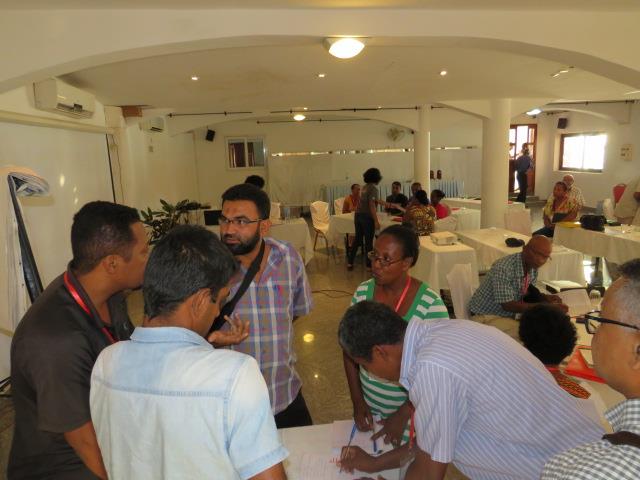Maintaining the Private Sector’s Commitment to Providing Health Commodities during the COVID-19 Pandemic
Following the outbreak of COVID-19 infections in Madagascar in early 2020, the government imposed a nationwide lockdown restricting travel and limiting business activities within the country. Despite these constraints, the United States Agency for International Development (USAID)-funded Improving Market Partnerships and Access to Commodities Together (IMPACT) program team was committed to finding ways to support its private sector partners in continuing to provide vital health commodities to their communities during the crisis.
Phone Survey and Coaching
In order to determine how the COVID-19 pandemic is affecting the suppliers of private health commodities in rural areas, IMPACT conducted phone interviews to survey 71 drug shops in the Atsinanana, Boeny, and Analanjirofo regions. The major issues identified were:
- Stock outs of malaria products, flu medicines, and Vitamin C, and restrictions on order quantities due to insufficient wholesaler inventory;
- Need for financing to purchase inventory;
- Requests for protective equipment from IMPACT.
Following the survey, IMPACT gave the partner banks a list of 61 drug shops needing financing. In Quarter 3, five drug shops received loans thanks to IMPACT’s intervention, and the banks are continuing to contact drug shops on the list. In addition, as a contribution to the COVID-19 response for the private sector, IMPACT decided to provide masks, hand sanitizer, and bleach to 143 drug shops and 53 pharmacies in five regions.

To continue helping drug shops improve their management challenges even when it was not possible to meet with them face-to-face, the IMPACT access to finance team adapted its coaching method from in-person to over-the-phone sessions, successfully coaching 16 drug shops in Quarter 3.
Creation of Drug Shop Association
IMPACT’s continued mentorship of drug shops during the lockdown allowed the project to support the creation of a regional drug shop association, l’Association de Depôts de Médicaments (ADEMERA), in the Atsianana region in April. Another association is in the process of being created in Boeny. These professional associations will help coordinate drug shop activities and improve operational practices as part of IMPACT’s business training and regulatory awareness-raising activities and should facilitate the development of an accredited drug dispensing outlet (ADDO) system in the future.
Supporting Partner Banks during COVID-19
The pandemic and the subsequent lockdowns have created significant economic hardship around the world, with banks in many countries cutting off credit to companies which have lost revenue. For pharmacies and drug shops, access to financing is especially important to ensure that they can continue to supply their communities with essential pharmaceuticals and medical supplies during the pandemic. The USAID guarantees, accompanied by technical assistance through the IMPACT program, have been crucial in allowing partner banks AccèsBanque Madagascar (ABM) and Baobab Banque to continue to lend to health commodity enterprises during the pandemic. In a time when the financial sector has been cutting credit to many sectors, the partner banks have been able to continue disbursing loans to the private health sector. Despite complications related to COVID-19, IMPACT supported partner banks in increasing the amount of loans disbursed between April and June, with 11 loans disbursed in Quarter 3, an increase of 37 percent from the previous period, and in strengthening the banks’ relationships with drug shops (eight out of the 11 loans disbursed). Additionally, thanks to the coverage of the U.S. International Development Finance Corporation guarantee, ABM was able to offer three health commodity enterprises restructured loan terms that were even longer than the six months recommended by the Government of Madagascar. Finally, IMPACT helped banks develop a new loan product (ACCES SALAMA) to support the health sector in purchasing equipment and supplies to respond to COVID-19.
